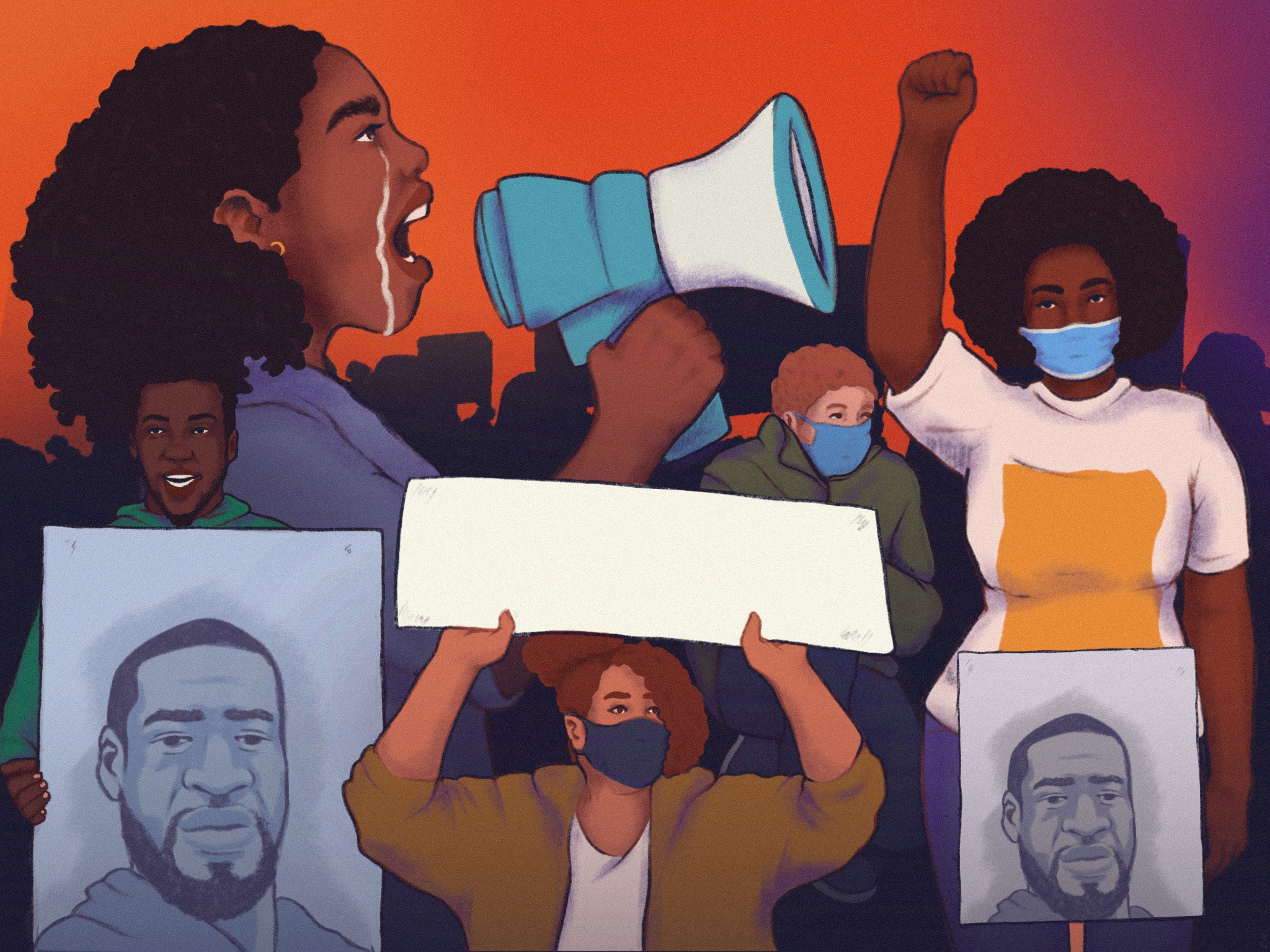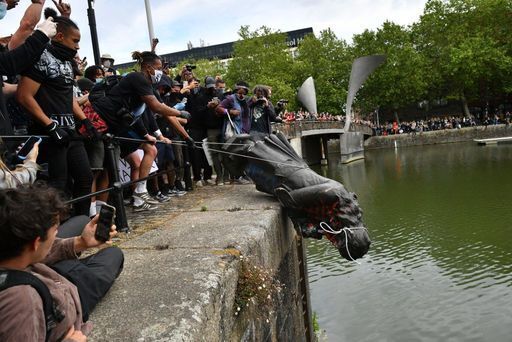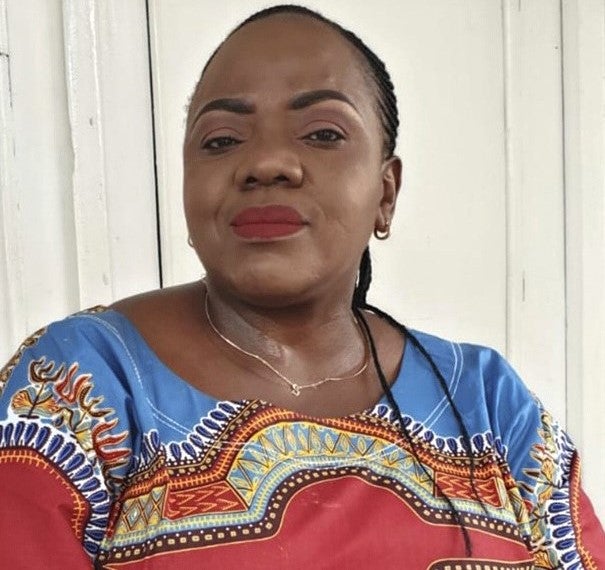‘Two steps forward, one step back’: How movement sparked by George Floyd’s murder has changed Britain
Special Report: The killing of a black man in America led to a wave of protest around the world, and the UK was no different. But 12 months on, have we seen lasting change? Nadine White talks to campaigners, activists and experts about how much progress has really been made in the past year


George Floyd’s murder at the hands of a police officer in Minneapolis sparked a movement not just in the US but around the world, bringing forth a global reckoning around race.
In Britain, demonstrators mobilised and took to the streets not just in solidarity but in protest at frustration with racism and policing in the UK. They carried placards with messages such as “The UK is not innocent”, taking aim at slaver statues and colonial relics. Hundreds of petitions urged institutions to tackle systemic inequalities, from the national curriculum to the black maternal mortality rate.
Now, one year on, how much progress has been made?
In the wake of Floyd’s death, public organisations were quick to speak up in favour of the Black Lives Matter movement, from the NHS to the Premier League, where players have taken the knee at the start of every fixture.
People also opened their purses: Black Lives Matter UK (BLMUK) received over £1m in donations, half of which is in the process of being released to black-led organisations working towards dismantling structural inequalities.
But there have been concerns, too, about whether commitments from authorities and industry have been meaningful – from the Covid response to discussions on racism in the media and even the royal family.
Our Supporter Programme funds special reports on the issues that matter. Click here to help fund more of our public-interest journalism
Exclusive polling by YouGov found that 42 per cent of black, Asian and minority ethnic (Bame) adults think race relations in Britain today are no better than they were 12 months ago, while 33 per cent believe they have got worse. Just 11 per cent say things are changing for the better.
Black Lives Matter UK said it had been “motivated by the resistance and organising” over the past year as “protesters connected the killing of a black American man in broad daylight” with racism that characterised institutions in the UK. But much of what came was “corporate and establishment lip service” to solidarity. A spokesperson added: “We do not believe that lip service, or ‘awareness’ equals liberation.”
‘A positive spin on slavery’
In the government’s response to the Black Lives Matter protests, Boris Johnson announced a commission on race that would “change the narrative”.
Concerns were raised that charity boss Tony Sewell, who was chairing the commission, and No 10 adviser Munira Mirza had previously denied that institutional racism was in issue in the UK.
And, when the report was finally published in March, campaigners said these fears were borne out. The conclusion was that racism was a “real force” in Britain, but the UK was no longer a country where the “system is deliberately rigged against ethnic minorities”.
It further suggested that geography, family influence, socioeconomic background, culture and religion all impact life chances more than racism.

Mr Sewell was also accused of putting a “positive spin on slavery and empire” after suggesting explaining its recommendation on teaching history in school, touting it as the “the Caribbean experience”.
Campaigners called for the PM to withdraw the report, with an open letter signed by Black Lives Matter UK, the Runnymede Trust race equality think tank and civil rights campaign group Liberty suggesting it “whitewashes over” the daily challenges faced by many.
There were questions, too, about the evidence used – academics listed as contributors revealed they had no involvement in the report. The conclusions on health outcomes for minorities, suggesting in some areas they were better than for white populations, were branded “damaging” by NHS Providers, which represents hospitals.
After months of pushing back against racism, campaigners told The Independent the review had undermined a lot of the progress brought forward since George Floyd’s death.
Weyman Bennett, co-convenor of Stand Up To Racism, said: “The murder of George Floyd shows that we have moved two steps forward and one step back.
“On one hand, the mass Black Lives Matter movement and the acknowledgement of racism and injustice meant steps forward but then, the UK government continue to deny institutional racism in this country, and refuses to accept that the UK is not innocent of racism and discrimination.
“Power concedes nothing without a demand and we demand justice.”
An unequal pandemic
Covid, too, has shown divided lines in Britain. At the start of the pandemic, deaths were higher among minorities, and a Public Health England report was commissioned to investigate why.
In June, it found widespread factors were to blame, concluding: “The unequal impact of Covid-19 on Bame communities may be explained by a number of factors ranging from social and economic inequalities, racism, discrimination and stigma, occupational risk, inequalities in the prevalence of conditions that increase the severity of disease including obesity, diabetes, cardiovascular disease and asthma.
”Unpacking the relative contributions made by different factors is challenging as they do not all act independently.”
While Covid-19 transmission, hospitalisation and death rate has soared among ethnic minority communities, vaccine uptake among these groups has been lower than the wider population as the government continues to roll out the long-awaited jab.

Lack of trust in the government and healthcare system due to structural inequalities, concerns around the vaccine’s safety plus targeted information campaigns have created a perfect storm for vaccine hesitancy.
According to the Office for National Statistics (ONS), the lowest rates were estimated among those aged 50 and over identifying as black Caribbean and black African, at 66.8 per cent and 71.2 per cent respectively.
This compares with 93.7 per cent of white British adults, with estimates for all ethnic minority groups lower than this.
Rates are also estimated to be lower in people of Muslim or Buddhist faiths, those who do not speak English, those living in more deprived areas and disabled people.
Aside from the direct impact, a year of lockdown has also seen an increase in racism. Over the summer, the Victim Support charity saw a 62 per cent increase in referrals mostly regarding race and homophobic abuse.
Such was the impact of these onslaughts, that some people were afraid to even sit in their own gardens, the organisation said.
Across the country, individuals, businesses and civil society are taking action
One person said their neighbour had spat on their shared porch and shouted racial abuse, while the neighbour of a key worker from a ethnic minority background blamed them for spreading coronavirus.
Another victim said issues with their neighbours had deteriorated since the protests sparked by George Floyd’s death, with neighbours saying “George George George” in between coughs.
Railway worker Belly Mujinga, 47, died with Covid-19 on 5 April following reports she had been coughed on by a customer at London’s Victoria station who claimed he was infected with the virus.
Read more special reports from our Supporter Programme
The #JusticeForBellyMujinga campaign was launched by activists and family members of Ms Mujinga, after the British Transport Police investigated her death but decided there was not enough evidence to charge anyone with a crime.
Some 2.1 million people signed the petition calling for her to receive justice, as it emerged that the Londoner had been instructed to work outside the ticket office by a supervisor against whom she had an outstanding race complaint on the day of her assault. She was not given proper PPE to work outside.

This month, a coroner decided to open an inquest into her case, saying there’s reason to suspect her death may have been “unnatural”.
Speaking to The Independent, Lawrence Davies of Equal Justice Solicitors, who is representing the Mujinga family, said: “Racial equality is not something that should exist from death, it must exist from birth. George Floyd's family, like Belly's, may achieve a measure of justice after death, but the issue for society is to facilitate racial equality from birth. Otherwise, we have no racial equality and we should not accept a post-death win, as justice.
“At present, racial harassment has doubled in the workplace since 2017. We are seeing more and more overt racism cases. However, and despite the emergence of the Black Lives Matter movement, only 1 per cent of Bame workers formally complain about racism at work, with 99 per cent being silent largely for fear of victimisation and structural issues with the justice system. This means that 99 per cent of racists are not challenged in their harassing conduct at work and nothing changes.”
The Cabinet Office’s “equality hub” has highlighted work carried out in the wake of the Public Health England report to “protect and support everyone” including minorities, such as translating advice into numerous languages.
International research also pointed to racial inequality in Britain as a driver in the pandemic, which has killed more than 150,000 people in the UK.
Marsha de Cordova, the shadow minister for equalities, said: “The events of 2020 including the unequal impact of Covid on black, Asian and ethnic minority people, the murder of George Floyd and the Black Lives Matter movement were a significant turning point. Across the country, individuals, businesses and civil society are taking action to address racial injustice.
“Worryingly the government’s response has been to sow division and publish a divisive and offensive report which downplayed the impact of institutional and structural racism.”
‘Take the blame’
In March, the Duke and Duchess of Sussex, claimed in an explosive interview with Oprah Winfrey that a senior member of the family – not the Queen or the Duke of Edinburgh – had made a racist comment about their son Archie.
Harry and Meghan said that the relative had raised concerns before their son was born about how dark his skin tone might be.
The couple also suggested that parts of the British press were racist and had targeted Meghan because of her race.
Buckingham Palace said in response to Harry and Meghan’s interview claims that the issues raised, particularly that of race, were “concerning” though “some recollections may vary”, and would be addressed by the family privately.
This thrust conversations about race to the fore once again, fuelling international conversations about systemic inequalities. A Buckingham Palace source said it was considering the appointment of a diversity chief as “more needs to be done” to address the issue.

This came as The Independent reported that race equality campaigners called for the royal household to be brought into line with equality legislation in response to Meghan’s claims that her requests for mental health support were ignored by the establishment.
The media, too, reacted strongly to the suggestion of racism within its ranks. Ian Murray, the head of journalism trade body the Society of Editors, responded to Harry and Meghan’s claims with a statement saying the UK media “is not bigoted and will not be swayed from its vital role holding the rich and powerful to account”.
His comments sparked an outcry, with a number of outlets and ITV News presenter Charlene White pulling out of the society’s press awards, while Murray later resigned from his role as executive editor, saying he must “take the blame”.
Lecturers and campaigners warned that the denial could still have discouraged young people of colour from entering the industry, which studies suggest is 94 per cent white, with only 0.2 per cent of journalists black.
‘The tide seems to be definitively turning’
In the US, police officer Derek Chauvin has been found guilty of Floyd’s murder and is due to be sentenced next month. In the UK, campaigners, experts and activists told The Independent that this tragedy had sparked real change in conversations around race as the case cut through the national consciousness.
YouGov’s polling found that 90 per cent of respondents knew who Floyd was, and nearly three-quarters were now paying close attention to news stories about race on these shores.
Dr Halima Begum, CEO of the Runnymede Trust, said the issue of race equality was now a matter of debate in classrooms, boardrooms and living rooms.
“As a result of the death of a black man in America, our nation has taken an unprecedented and unexpected opportunity to examine the significant progress the UK has made on the path towards racial equality, and to reflect on the challenges that must still be resolved for us to become a post-racial society,” she told The Independent.
“While racial injustice cannot be ignored, for perhaps the first time in history the tide seems to be definitively turning in the favour of entrenched race equality. This shift is welcome, and we are encouraged to think where the next 12 months might lead us.”
Join our commenting forum
Join thought-provoking conversations, follow other Independent readers and see their replies
Comments
Bookmark popover
Removed from bookmarks